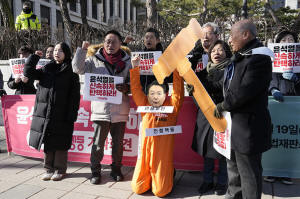Yoon appears in 2 different South Korean courts while defending his
martial law decree
 Send a link to a friend
Send a link to a friend
 [February 20, 2025]
By KIM TONG-HYUNG [February 20, 2025]
By KIM TONG-HYUNG
SEOUL, South Korea (AP) — Traveling around Seoul in a prison transport
vehicle, South Korean President Yoon Suk Yeol appeared in two different
courts on Thursday, contesting his arrest on rebellion charges in one
and fighting an effort to remove him from office in the other.
Both cases — one on criminal charges, one an impeachment — are related
to his brief imposition of martial law in December.
Security was heightened at the Seoul Central District Court as the
motorcade transporting Yoon arrived for a preliminary hearing that
involved discussions of witnesses, proposed evidence and other
preparations for his criminal trial.
The court, which scheduled another preliminary hearing in March, was
also reviewing a request by Yoon’s lawyers to cancel his arrest and
release him from custody. Such challenges are rarely successful. The
court was expected to make a decision later Thursday.
Yoon next traveled across the capital to the Constitutional Court, which
is nearing a decision on whether to formally remove him from office
after was impeached by the National Assembly. Yoon temporarily left the
courtroom when Prime Minister Han Duck-soo appeared as a witness. Yoon’s
lawyer explained to the justices that his client believed it would
damage the country’s image if both were seen in court together.

Han supported Yoon’s claim that the liberal opposition, with its
legislative majority, had disrupted state affairs through pushing for
impeachments of senior officials and undermining the government budget.
However, Han repeated his previous statements to lawmakers and
investigators that Yoon had possibly violated constitutional
requirements by failing to deliberate in a formal Cabinet meeting before
declaring martial law on Dec. 3. Han said he didn't know of any Cabinet
member who expressed support of Yoon's step.
Yoon returned to the courtroom as the justices called another witness,
Hong Jang-won, former first deputy director of South Korea’s spy agency.
During the hearing, Hong maintained his earlier testimony that Yoon
ordered him to help a defense counterintelligence unit detain key
politicians, including National Assembly Speaker Woo Won Shik and
opposition leader Lee Jae-myung. Visibly irritated, Yoon denied ordering
anyone’s arrest and accused Hong of lying and fabricating evidence.
[to top of second column]
|

A protester wearing a mask of impeached South Korean President Yoon
Suk Yeol attends with his fellow protesters during a rally calling
for Yoon to step down in front of the Constitutional Court in Seoul,
South Korea, Wednesday, Feb. 19, 2025. The signs read "Impeach Yoon
Suk Yeol quickly." (AP Photo/Ahn Young-joon)

Yoon was indicted Jan. 26 on rebellion charges, which carry a
potential punishment of death or life in prison. In South Korea,
presidents have immunity from most criminal prosecutions, but not on
charges of rebellion or treason.
The indictment alleges his imposition of martial law was an illegal
attempt to shut down the National Assembly and arrest politicians
and election authorities. The conservative Yoon has said his martial
law declaration was intended as a temporary warning to the liberal
opposition and that he had always planned to respect lawmakers’ will
if they voted to lift the measure.
Yoon’s presidential powers were suspended when he was impeached Dec.
14, leaving him to fight for his political life at the
Constitutional Court.
Martial law was lifted about six hours after Yoon declared it but
has caused political turmoil, disrupted high-level diplomacy and
tested the resiliency of the country’s democracy. Yoon’s
conservative supporters rioted at the Seoul Western District Court
after it authorized his arrest last month, while his lawyers and
ruling party have openly questioned the credibility of courts and
law enforcement institutions handling the case.
Yoon has continued to express contempt for his liberal rivals for
obstructing his agenda and endorsed baseless conspiracy theories
about election fraud to justify his ill-fated authoritarian push.
Yoon’s defense minister, police chief and several military
commanders have also been arrested and indicted on rebellion, abuse
of power and other charges related to the martial law decree, which
involved hundreds of heavily armed troops deployed to the National
Assembly and National Election Commission offices.
All contents © copyright 2025 Associated Press. All rights reserved
 |